- From Faith Current: “The Sacred Ordinary: St. Peter’s Church Hall” - May 1, 2023
- A brief (?) hiatus - April 22, 2023
- Something Happened - March 6, 2023
MIKE GERBER • Devin’s excellent post on James Marcus’ graceful, slightly Slate-only-smarter Letting Go of The Beatles spurred some thoughts, which were too long to put in a comment. I wrote this in haste and I can feel the dullness of my tools (doing a lot more business-stuff than writing-stuff these days), but I paste them below.
It was fifty years ago today…
Beginning in May 1964 and ending that November, the BBC broadcast a 26-part documentary called The Great War. Produced with the cooperation of the Imperial War Museum and its analogues around the world, it is a fascinating examination of that conflict, exhaustive and exhausting. Even viewed on YouTube today from my sunny office here in California—remote from the time and topic in every way—The Great War is epically powerful, drenched in sadness and grandeur. If one pauses while watching to remember that these capering patterns of light and dark were once real people…well, the sense of loss is almost too much to bear.
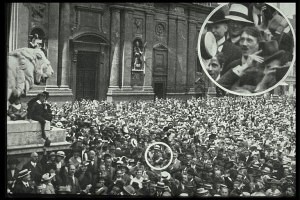
Evil Beatlemania, starring you-know-who
Yet I encourage you to watch it. I’d encourage everyone to watch it, because World War I expresses fundamental aspects of the human experience, many of which we seem determined to forget; it is history distant enough to be appraised yet modern enough to be understood. Even if the horizons of your interest don’t extend past the Fabs themselves, it remains essential: you can’t really understand what the Beatles were, where they came from, or what they meant, without at least a passing knowledge of the European self-mutilation that began with World War I. All the Fab biographies start with the Blitz, for obvious reasons, but the Great War cast as big, if not bigger a shadow on Beatle-Britain. The nearest antecedent to Beatlemania? The crowds of August 1914.
The simplified version of the Sixties (more about that later) is one of youth ignoring history, but in reality that decade was obsessed with what had come before; one can only reject what one knows. The same summer that A Hard Day’s Night packed cinemas, The Great War kept Britons glued to the telly—it’s estimated that 17% of the populace watched each episode. The show lasted for half-a-year; this was horror-cum-nostalgia on a massive scale. Without question, it and the grim anniversaries that followed helped usher in the vogue for Edwardiana that blossomed on Carnaby Street, and it’s my contention that Sgt. Pepper should be listened to as an unconscious attempt to heal the psychic wound inflicted by World War I. John, Paul, George and Ringo (like every Briton after 1914) absorbed that trauma along with their mothers’ milk; they lived in a world of ghosts. Suddenly the maligned tracks (“When I’m ‘64” “Within You, Without You”)—and the justly celebrated ones (“A Day in the Life”)—snap into a kind of focus. So it is a concept album, after all, only one that works in the realm of dreams. More importantly, the electricity of Pepper, its sense of cultural release—the Goodbye to All That-ness of it—makes sense. And not for nothing does the uncommonly sunny “Summer of Love” recall that earlier epochal English summer of 1914. The last good time.
To digress: this historical template colors my vision of the next four years of the Beatles. What is the White Album if not the Beatles’ Somme, a great, doomed offensive, a months-in-the-making attempt to win the War, destined to leave a broken, bickering Army in its wake? How are Paul’s pleas to “go back on the road” not increasingly desperate, increasingly doomed attempts to break through, to break the stalemate? For sure they were greeted with the rolled eyes and derision of the seasoned campaigner, John and George as two Tommys who’ve heard it all before, and have lost too much to believe in a dream. OK, I’ve been blogging next to Devin too long, but allow me a final filigree: one could argue that the state of Beatledom in 1971-72 was not unlike that of Europe in 1918-19. Exhausted, cynical, saddled with a brokered peace which brought nothing but bitterness, each party feeling aggrieved, fighting a creeping dread of what had just been lost, balanced by a giddy attempt to convince oneself that the future would somehow be better. How is glam rock not Weimar? Even Lennon’s Lost Weekend is something F. Scott Fitzgerald would understand—in both England and America, the early 70s looked at the 20s, and saw itself.
But all that’s another post. To the surprise of everyone involved, the Beatles of 1964 turned out to be an historical turning-point, just like August 1914. However, for a million reasons our current media culture can’t do serious, and so in the commemorations there’s this sneaky little feeling that the Beatles were just a rock band…after all, didn’t Lennon himself say it? And if we were only talking about a rock band, James Marcus might be onto something. Not only would it be appropriate and healthy to let that clotted ephemera become distant from our experience, the holding onto it would be evidence of something strange and curdling going on in our culture. Remembering World War I in 1964 by watching The Great War, that’s nostalgia, a period of intense, media-driven remembrance spurred by five sets of ten; unimaginable horror respectfully diminished into a consumable, but diminished nonetheless.
But that’s not what goes on every November 11th in the UK—still—and it’s not what is going on with the Beatles today. Give them a rest? We could no more give the Beatles a rest than forget our parents. Because of its size, and its legacy, World War I belongs to us all—and so do the Beatles.
“Of course we watched them on Ed Sullivan.”
As part of the generation that witnessed the Beatles firsthand, Marcus could be forgiven for seeing the Beatles as so much smaller than they really are. Having said that, it’s a bit ironic that his fine essay decrying Boomer self-regard should display this characteristic in spades. The Beatles—and I would argue, the whole Utopian strain of the Sixties—are no longer property of the Boomers. They haven’t been for years. The positive legacy of the Sixties, everything from Yoga and meditation to organic food, has become common property. It’s the positive legacy of the Sixties that gave us a black President—and it’s the surprising universality of those values across our society, that made it happen many years before anyone predicted it would. Not even Martin Luther King was so optimistic; and in the years after his death, most were much less optimistic than King had been.
The Beatles are the spokesmen for the positive legacy of the Sixties, especially to kids. It’s only the violence and silly self-regard of the Sixties that’s been left to the Boomers…which is why, in Marcus’ essay, he fastens onto the song “Revolution.” That’s a Boomer totem, 1968 in aspic, suitable for playing under footage of Paris and the Chicago convention. It’s not relevant to anyone but Boomers, who are obsessed with its authenticity (especially vis a vis the Stones’ “Street Fightin’ Man.”) “Revolution” is pop culture self-consciously attempting to become history, and failing. What has endured—and what is clearly more ur-Beatles because of its enduring—is Paul’s apolitical song of hope and healing, “Hey Jude.”
The Band You’ve Known for All These Years
The people behind this blog aren’t Baby Boomers; Devin was born in ’66, I’m a product of 1969, Ed’s from 1971, and Nancy, well, she’s probably much younger, I’m too polite to ask. Unlike Marcus, looking at books about the Beatles doesn’t make me feel like I’ve stopped time, any more than watching The Great War does. Unlike Marcus, I have no nostalgia for the time when I was deepest in Beatle-thrall, teenage years which I found incredibly painful and still cost me $125 a week. The Beatles exist apart from me and my life—they aren’t mine, they just are.
I think this is the fundamental difference between first-generation fans, and everybody else. For me, CBS’ recent show on the fiftieth anniversary of the Fabs’ on Ed Sullivan didn’t stir memories of watching that in person, but that’s what all the media coverage was about: Elsie Kranepool, 61, was living with her parents in Canarsie when she turned on that fateful Sunday night… Where were we living then? What did we have for dinner that night? Were Mom and Dad fighting? It must be cozy to have those kinds of associations with such great music; but it’s also incredibly limiting. It shrinks the Beatles—and the history they were part of—to the size of one’s own life.
“Why Would You Listen to That?”
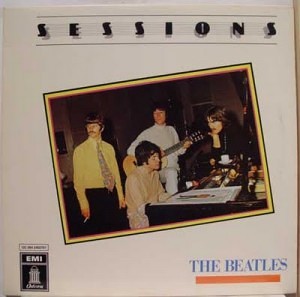
Sessions (False Odeon): One of my favorite Beatlegs as a kid.
I remember the first time I played Sessions for my beloved Beatle aunt (born 1952). To a 16-year-old Beatle fan of the mid-80s, that LP was everything—not only did it include several of the holy grails, actual finished Beatle songs, it was also a test-run for official product—in essence a recognition by Apple and the surviving Beatles that we younger fans existed. So I dropped the needle, expecting to share a moment with Mary. I guess I was hoping, in some small way, to return the favor she’d done me, by introducing me to the Beatles ten years earlier. So we sat, in silence. At the end of the first side she said, “Why would you ever listen to this instead of the real albums?” (I didn’t play her Side Two.)
What Mary, God bless her, didn’t understand—what she couldn’t understand—was even then the Beatles belonged to everybody. Particularly in the wake of Lennon’s murder, new Beatles music became cause for celebration. Whether it’s scratchy and partial, a castoff with obvious flaws, or an after-the-fact concoction held together with scotch tape and Jeff Lynne, it’s always the excuse for a party.
The Beatles ≠ Jim Croce
For all of us who weren’t crouched in front of our televisions in 1964, this anniversary is no more (and certainly no less) than that: a convenient excuse to celebrate something great, to have fun. It’s not an exercise in our own childhoods or forced kowtowing to a bigger demographic. Compare, for example, the doo-wop shows PBS hauls out during pledge drives; can you imagine anybody under 18 watching those ? Likewise, can you imagine many 15-year-olds buying Jim Croce’s greatest hits? Not all pop culture from the past is created equal. Francis Ford Coppola’s Godfather movies (at least Part One and Two) are universal classics enjoyed by all; his first movie, a goofy, overheated 1966 coming-of-age comedy called You’re a Big Boy Now, is unwatchable except as nostalgia. (I saw it on TCM last week.) Sure, it was popular in its day—but it ain’t history.
Our current media, made omnipresent by a surfeit of bandwidth and an increasingly post-employment population, looks at the past as just another source of content. The more film exists of an era, the more that past is shown; that’s why World War Two is so much more common on TV than World War One. And what can be shown takes on outsized importance; you see the same clips from Woodstock, or topless grooving in the Haight, or of a plane cruising through sooty clouds as napalm explodes in the jungles of Vietnam. Reduction. For lots of reasons, nostalgia is always the most commercial stance to take, and so when the Beatles appear in the media, it’s usually as a chunk of beef in that canned stew labeled “the Sixties.”
Marcus is right to be tired of this predigested version of the Beatles and their era. I’m tired of it, too. And he’s right to define this as a Baby Boomer-driven phenomenon, and turn up the Oscar music, hoping his cohort will get the hint and finally, reluctantly, leave the stage. Boomer dominance of media is real, and it’s a net-negative for the culture. Whether it’s Lorne Michaels’ outsized footprint on TV comedy, or Martin Scorsese’s endless parade of Men Behaving Badly pictures—we know what these guys have to say. They’ve said the same thing over and over for decades. Giving them more money and more access and more distribution to say it isn’t art, or even audience preference, it’s demographically driven lazy commerce.
A Chicken in Every Pot, Every Rapper a Genius
And this idea that popular culture improves linearly, like processing speed? That’s lazy commerce, too; advertisers want young people, so they support what they think young people like. And the big culture-combines want to sell you what’s new, because that’s the easiest thing to create. But that’s not what’s going on with the Beatles; haters aside, liking a group that split up 44 years ago runs counter to everything corporate media wants in a product. It’s inefficient, unmanageable, demographically spread, finite, et cetera—in this regard, the all-important one of making money, the Beatles are the opposite of Justin Bieber or One Direction. Yet how many times during these celebrations did you hear them called “the first boy band”? If that’s what you see when you look at the Beatles, you’re not really looking.
Very little popular culture—no matter how great—becomes history. Many things outside the work itself have to conspire for that to happen, and while it’s now become common for every generation to claim its favorite entertainers as an historical turning point, most of the time that claim has been proven to be inaccurate. Your liking Kurt Cobain, and even Kurt Cobain changing the face of rock and roll, doesn’t make Kurt Cobain history. Very talented, very popular, and very rich, Kanye West and Lady Gaga are, if anything, more prominent in our culture than is strictly merited by their work. They are popular artists practicing their craft at the highest level…who only spike into larger consciousness only when they make a gaffe, or have something to sell. That is, when the apparatus of publicity pushes them into the heads of people not already obsessed with them, in an attempt to make more money. There’s nothing wrong with this; it’s what people in 1964 thought the Beatles were, and would stay. But that’s not what’s going on with the Beatles today.
The Aero and The Tivoli
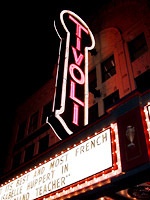
Young Mike: “What’s that funny smell?”
Once a year, the rep movie house fifteen blocks away plays a Beatles double-feature, usually A Hard Day’s Night, and Help! I always go, and I always enjoy myself. Yes, there is nostalgia in it—after all, a rep theater in St. Louis called the Tivoli was where I first saw both movies, over 30 years ago. But most of my pleasure comes from the films themselves. (“What are your hobbies?” “TITS.”) And there’s another pleasure, too: more of the crowd is under ten than over seventy. There is a certain type of kid who seems to be drawn to the Beatles over every other kind of music. Sometimes encouraged by parents, often not (mine thought it was weird: “Why don’t you like your own music?”) Beatles-love has become a rite of passage, a stage of development which some people move on from, and others don’t. Who could’ve predicted this? No one, certainly not the Beatles themselves.
So as the years roll on and the interest does not seem to be disappearing, it’s clear that the Beatles—their music, yes, but also their dress, their attitude, those four people—are not merely an artifact of pop culture, not the property of one era, sealed from future generations by evanescent outlook and context. Though the media has and will and will always try to diminish them into much less than they were—the better to sell them—the Beatles have become a permanent part of our culture…which will only be replaced when someone or something performs their function better than they can. Not just for one demographic, but for everybody.
“You can be replaced, chicky-baby.” “I don’t care.”
That’s why there’s never been a “next Beatles.” The Beatles aren’t like Lady Gaga, or Kanye West. They’re like air conditioning, a refrigerator in the home—they’re how we live, now. They aren’t musicians playing music, they are a development of modernity deeply emblematic of how we live here in the West; and as other countries have acquired our style of living, they’ve acquired Beatle-love, too. For better or worse, we are stuck with John, Paul, George and Ringo. They will not—cannot—be replaced until something does better, what they do for us so well.
That day will come, for sure, and it won’t look or sound or feel like what we expect…but I wouldn’t hold my breath. And I certainly won’t let them go until something better, truly better, comes along.


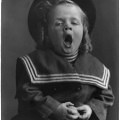
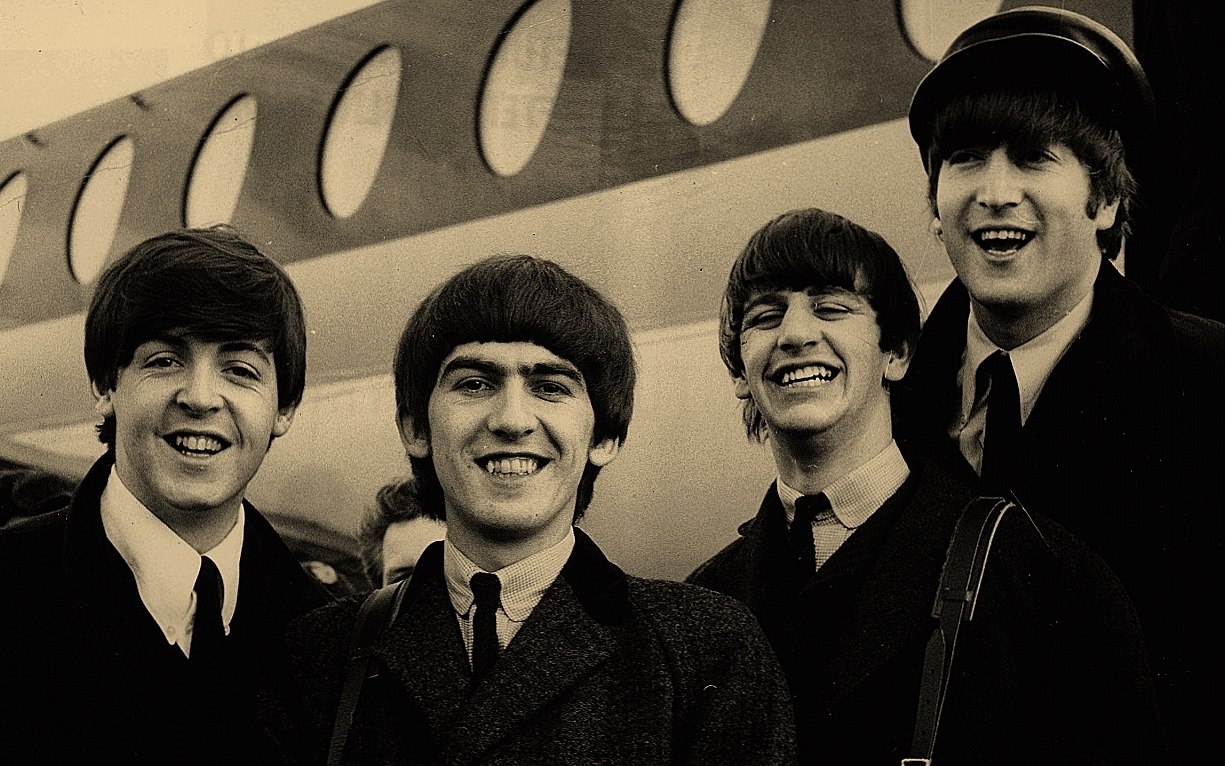

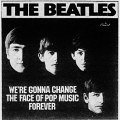
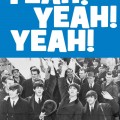
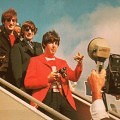
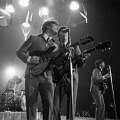


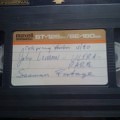
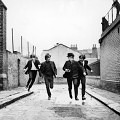
Goog God Almighty, this is a really fine piece of writing, and thinking. Has the link of the Great War and pop culture occurred to you only just now, or has it been wandering the hallways of your mind for a long time? Any other folks you know of that wrote or thought about it? Except of course Roger Waters from Pink Floyd fame?
Well, thank God, @Rob–I tinkered with it all yesterday and was never sure it made the grade. With humor, there’s a sound that means success. I don’t understand how other types of writers do it. I’d be a nervous wreck.
I became obsessed with WWI after taking a class from Sir Michael Howard, and then developing a chronic illness that nearly killed me. The first trigger is related to the Great War in ways I understand, the second in ways I cannot figure out–in the suffering, perhaps? WWI is, to me, war laid bare–modern enough for us to recognize, but stripped of all the false cleanness of contemporary technology. People often consider WWI to have put the lie to the idea of progress, and they’re (mostly) right in the Victorian “let’s make all the natives screw face-to-face” kind of way. But it’s impossible to learn about the War and not come away feeling an urgent need for genuine progress. The War’s strange lesson was that it’s impossible to do much good in the world, but the horizons of evil are limitless. While one can understand why people came to this conclusion, it’s a distortion. If one increases, the other increases; and we can, as a species, decide what we express and what we release.
Much of my mewling about “psychedelia” on this blog comes from an appreciation of this urgent need for psychological progress; that if we bring the same old mind-states to the same old problems, we will generate the same old horrors–only amped and universalized by ever more powerful technology. What is required is a fundamental shift of mind–a fundamental move towards non-harming and an appreciation of the oneness of all creation. The Beatles got this; their music expresses it; the Beatles seem to be it–which is the nubbin of their continuing magic. That’s what’s so tragic about John Lennon taking a powder from the Beatles to work for peace–Beatle music has proved to be the most durable expression of peace and harmony created by modern popular culture. Regardless of how J/P/G/R meant it–that’s how people experience it. This is why children continue to be attracted to the Beatles.
Peace and love–or if you like, non-grasping and non-harming–these are alien concepts to most, but they are real and reachable, and once you’ve glimpsed them, you realize they are more workable, more stable, and more durable than the typical mindset, not less. And so a mass social movement acknowledging and encouraging these mindstates is a precious thing, and something that should be remembered and revered so that it can nurse the next flowering.
The greatest casualty of the Great War was–I was going to write “optimism,” but that’s just the outward appearance; what died was a faith in decency, both others’ and our own. It was replaced by what is called “realism,” which is really a faith in violence; this has dominated our affairs ever since. And how’s that working out for us? We’d go all-renewable energy, but it’s just not realistic. Universal literacy, an end to hunger–possible, surely, just not realistic. Meanwhile, creating a worldwide network of killer robots? TOTALLY DOABLE! “It may take decades, and billions, but by God, we’ll do it!” This is not genuine “realism”; it’s the mindset of war, and WWI is where it was put into the driver’s seat. It remains there today.
So when powerful chemicals made enough brains skip out of this groove, it was only natural that The Beatles–along with lots of others–would go to the point of the wound, WWI. The single most important insight of the psychedelic movement was how much of what passes for realism is actually a narrowing of possibility at the behest of the ego; and while it’s easy to look at flower children and laugh at them for their failure to appreciate “reality,” that’s exactly the opportunity they offer. If one is looking for quixotic behavior or narcissistic delusion, the violent fantasies of the counterculture which followed in 1968 and after were not only strategically worthless, they were tactically worthless as well. Conservatives despise the utopian 60s because they showed, for a time, the infinite possibilities of human society. The violent 60s suit them just fine because it’s the same game, only with beards.
Getting back to the Great War: I don’t think the psychological damage it inflicted upon humanity can be underestimated, and I don’t think this trauma will be healed until there is a countermovement of compassion on the same scale. The last time I was in England (1997?) I saw the Great War everywhere. I do not know Roger Waters’ work on it, but I’ll investigate. Once again, delighted you liked the post.
The footage of The Beatles at the Cavern performing “Some Other Guy” is so primitive that it looks like it could have been filmed during The Great War.
Hi Mike! Thanks for responding at such length, and so thoughtfully. I appreciate the kind words for my “slightly Slate-only-smarter” essay–I’ll take that as a compliment, I guess–and again, we can agree to disagree on certain matters. Not on all them, to be sure. Your suggestion that my very proximity to the first Fab invasion might actually diminish my view of them is something I had never thought of before. Yes, they’re part of my personal history and that may eclipse their bigger role as a laughing race of freemen, etc. It makes sense. I’ve got to say that I’m not sold on the idea that WWI casts the deepest and darkest shadow over Beatles-era Britain. Come on, these guys were born during the Blitz, German bombers hit Liverpool sixty-eight times, killed thousands of people, and demolished large parts of the city. Paul’s childhood memories include frolicking in bomb craters, and what all four of them grew up with was Britain’s drab, crumbling, postwar austerity. I would wager that the so-called Good War had a much bigger psychological overhang for the Fabs. As for the BBC Great War documentary–impressive, but many more people were glued to their sets to watch “Steptoe and Son,” a father-and-son situation comedy about two junk peddlers (later the basis for “Sanford and Son” in this country). Or “Coronation Street,” a North-of-England soap opera whose top 1964 episode drew 21.3 million viewers–that is, 39.5 percent of the entire population. Now, that’s enough lingering in the statistical weeds of UK television history. I think you’re quite right that the positive aspects of the Sixties legacy are no longer the private property of the Boomers. I’ll add that the real thrust of my essay was not to kick the Boomers around, nor to suggest that the ongoing popularity of the Beatles is some kind of Pavlovian scheme put in place by ex-hippies. Least of all did I mean to argue that we should all burn our 2009 remasters and listen to Procol Harum instead. What I intended was a kind of thought experiment: might I attempt to shuck off my Fab-forged shackles and look at the band with a less adoring, even skeptical eye? Just for a moment? Because for me, underrating them (the Beatles = just another rock band) is highly problematic, but so is overrating them (the Beatles = World War I, or whatever historical watershed you want to insert). I was also interested in taking a longer view of artistic reputation. About ten years ago, I reviewed the first, massive volume of Gary Giddins’s Bing Crosby biography, “A Pocketful of Dreams,” and it was an object lesson–an Ozymandian lesson, I should say. I was amazed at the extent to which Crosby dominated the American cultural landscape for more than thirty years: records, radio, movies, even sheet music. (“Sweet Leilani,” which Crosby sang in the 1937 film “Blue Hawaii,” sold 54 million units of sheet music! And of course he had more Number 1 records than, well, the Beatles.) And he wasn’t just a commercial success, he was a global icon: a plainspoken, pipe-smoking projection of what an American was. Yet Crosby has vanished–no ping on the pop-culture radar at all. Maybe he’ll make a comeback, just like Monteverdi. Or maybe not. But I have to at least consider the possibility that the Fabs could fall into the same black hole of disregard and amnesia. Again, as a thought experiment. Finally, let me float the heretical suggestion that there are artists with a similar throw weight and cultural centrality, at least for me. Not a lot of them, that’s for sure–but I find (for example) Duke Ellington’s artistry as vast and beautiful and bottomless and influential. There will never be another Beatles, we’re in complete agreement on that proposition, but to view our post-Sixties modernity as essentially Fab Four handiwork feels narrowing to me, not expanding.
Hi James! Lovely to see you ’round these parts. Please come back often!
“What I intended was a kind of thought experiment: might I attempt to shuck off my Fab-forged shackles and look at the band with a less adoring, even skeptical eye?”
And I think, in this, you succeeded splendidly. I am sure my post did not spend enough time mentioning how much I liked your piece; the only reason that it spurred my thoughts was its thoughtfulness, fine construction, and lucidity. (The only Slate-y part was the tipping of a sacred cultural cow, but you did that much more thoughtfully than they ever do.)
I haven’t time this morning to address your comment point-by-point, but I would say this as an overarching thought: just because Tim Leary was a nut, doesn’t mean he wasn’t right about the Beatles. There is a hard, bright line between then and now that begins in 1964; and so many of those things are evident in the Beatles. And they didn’t stop; over the next six years (six years!) they invented, promoted or adopted so many things that we now take for granted as a culture. Bing Crosby or Duke Ellington did not change the way American men looked; they didn’t turn whole sections of popular music into career suicide; they didn’t change the way kids interacted with their elders; they didn’t have any impact on politics or–really consider this for a second–religion. For who and what they were, and who and what they inspired, and who and what they followed, the aggregate effect of four musicians from Liverpool has been immense. And their influence is continuing, overtly, 50 years later. That is something historical. Bing Crosby was a very successful actor/singer. Not the same.
“I’m not sold on the idea that WWI casts the deepest and darkest shadow over Beatles-era Britain.”
Some historians consider WWII to be a continuation of WWI, in that it’s one single conflict with a 20-year caesura, and I agree with them. If one looks at the changes wrought upon the combatant societies, these changes happen during the first war, and the second is a continuation/intensification of those changes. It’s the Great War, not World War Two, that brings total war against civilian populations, air warfare, working women, mechanized death, racial genocide, world-wide fronts, and so forth. World War Two simply intensifies these “inventions” of the Great War. So why don’t more people study it? Because it’s got a shitty story. There’s no hero, no villain, no movement, no drama–nothing happens except people die. And as I mentioned in my post, the paucity of good film makes it much harder to broadcast. It’s only in America that WW2 is viewed as the big shift, and that’s because, for America, that was generally true. In America, WWI was brief and comparatively painless. But even over here, WWI’s effect was huge: if, on this bright Sunday morning, you’re looking for the birth of the American surveillance state, it happens in WWI. Prior to then, not only did the apparatus not exist, the attitude was considered deeply un-American, exactly the type of “Prussianism” that we were opposed to.
Getting to the Fabs in particular–and this is really where my lack of time this morning will show–the main fact of their growing up wasn’t the threat of Hitler, it was (as you said) the economically blighted society that they were born into. That economic blight was a direct result of the vast outpouring of bodies and treasure that began in 1914. Britain crippled itself in that first war; if you look at the chronology, the real damage seems to have been done during WWI, not WW2. Prior to August 1914, Britain was a prosperous Empire, the most powerful country in the world; by 1919, they were the US’ junior partner, and that situation intensified in the 20s, 30s, and 40s. That’s why, by the time John, Paul, George, and Ringo came along, it was natural to be in love with America.
Fascinating facts about “Steptoe and Son” (or as we’d recognize it, “Sanford and Son”?) and “Coronation Street.” Which buttresses a point I was trying to make but didn’t make well in the piece: “The Great War” was 1964 Britain’s version of CBS’ recent celebration of the Beatles on Ed Sullivan: mass nostalgia brought on by an anniversary. It’s not the same thing as these massive historical events that reshape the way we live. World War One is where modern life began; and it seems that the Beatles fit that modern life better than any other musical group.
As to the positive elements of the Sixties not being the property of the Boomers–the more I think about it, I don’t believe they EVER were property of the Boomers, but continuations/intensifications of ideas that had been floating around for decades. The Boomers focused them into their current cultural forms, and in this the Boomers were simultaneously guided and encouraged by the Beatles.
“to view our post-Sixties modernity as essentially Fab Four handiwork feels narrowing to me, not expanding.”
Perhaps so, but I’m not as interested in whether it’s narrowing or expanding, but actually how it is (if that makes any sense). My point is that the Beatles are a much bigger “cause and condition” of the way we live now in the West than any other popular music; and that they can only be properly understood as a cultural force the size of a war, or the Pill, or women getting the vote, and so forth. The Beatles were not, and certainly are not, a more popular version of Psych Furs or even the Rolling Stones, and experiencing them first-hand makes that harder to see, not easier. To you they may not be so big; to you, having lived through the changes of the Sixties, they may seem incremental and shared; to me, looking at the history and looking for points of before/after, the Beatles come up a LOT. And I feel it, too–I firmly believe that, had The Beatles never existed, or even if the Beatles had been something like the Rolling Stones, I wouldn’t have spent last weekend listening to the Tibetan Buddhist Anam Thubten. That’s a sample size of one, me, but I think there’s something there, and I think the continuing popularity of the Beatles among young people is evidence of this…vision of the world that they seem to embody and encourage.
Once again, thank you for your lovely essay. I really enjoyed it, and am grateful for the thoughts you shared and the thoughts you’ve inspired. If you do anything Beatley, please get in touch so we can direct eyeballs your way.
Roger Waters’ last record with Pink Floyd, “The Final Cut”, has Remembrance Day poppy on the cover, but apart from that, I think, it’s largely about WWII and the Falklands War. Thinking about it though, it’s probably about all wars, including future ones (“Two Suns In the Sunset”). I find it very hard to listen to, and very hard to assess, because it’s so relentless. Then there’s stuff like “Goodbye Blue Sky”, or “When the Tigers Broke Free” from the “Wall” film… I’m not sure much more can, or needs to be, said about war in music.
For the record, I was born a few weeks before “Revolver” was released, so I’m at the forward edge of what’s usually called “Generation X,” and I’m also, it appears, the Elder Statesperson of this blog. In that capacity, let me say that I doubt very much that the Beatles will ever fade away to the degree that Bing Crosby has. There will be periods (like now) where they’re more prominent, thanks to media hype, and periods (like the late 70s) when they’re less prominent, but the body of work they created is too enduring to fade permanently. And the songbook is too pervasive: think of your favorite Beatles cover versions. I bet you can name ten without trying.
I agree with Michael that there are some big differences between first generation fans and later generation fans when it comes to how driving a force nostalgia is. If I wanted to try recapturing my youth with the music I was listening to in high school or college, I’d be writing for a Cheap Trick or Psychedelic Furs blog. No offense to those guys, who did what they did quite well, but while I feel affection for that music and that time, there’s not enough there to engage me deeply for very long. I didn’t start listening to the Beatles regularly until I was an adult, and though I intermittently suffer the kind of fatigue with them that Devin describes so well, I keep coming back.
And while I agree that there are musical artists with “a similar throw weight and cultural centrality,” if we’re talking about popular music (vs. jazz), we’re pretty much down to the Rolling Stones and Bob Dylan, in my opinion.
The harsh reality is that there’s a big gap between the artistic first tier and everything else. That’s why we’ve probably been to a Shakespeare play but few of us have seen a production of anything by Christopher Marlowe. It’s why we know some Dickens but have no idea who Elizabeth Gaskell was unless we’re grad students in a Victorian lit class. Looking at Bing Crosby here is instructive, because while his reputation has certainly faded, other vocalists of his era haven’t suffered the same fate: Ella Fitzgerald, Billie Holiday, Nina Simone, and Frank Sinatra are still around in a way he isn’t.
So I expect the Beatles to keep going “in and out of style,” when it comes to how much attention they get in popular culture, but to last throughout such changes.
Nancy, your Stateswoman gavel is coming in the mail.
Ah, the many, many uses I have for such a gavel . . . . it can’t get here too soon!
Mike, Nancy, there is much to ponder in your thoughtful responses–many thanks. I can’t dive in sufficiently here, but will limit myself to a few brief comments. If you wrap both world wars into a single ruinous civilization-slaying conflict, one a short intermission in the middle, that puts things in a different light. It makes Mike’s argument more plausible for me. But in my heart of hearts, I think you might have been listening to Anam Thubten this weekend even if the Fabs had never materialized. They put some of these great Sixties cultural currents into motion, channeled many others, but I can’t actually chalk them all up to four guys from Liverpool, or to any guys in particular. Hell, to put your stamp on so many of them is an amazing accomplishment, and that’s on top of the actual artistic product, which is mostly (as we like to say) beyond compare. And still, Leary was a bit of a nut. So I don’t view post-Sixties life as Planet Beatles, not in the all-encompassing way you do. Regarding Bing Crosby: he did actually put swathes of the music industry out of business, because in Giddins’s argument, he was the first great singer to realize the potential of the microphone–the way it could turn musical performance into an intimate, conversational, often erotic experience. A whole generation of leather-lunged belters, who had been taught to project to the last row of a giant vaudeville theater, were soon put out to pasture. In that sense, Frank Sinatra comes out of his sleeve, and so does Billie Holiday. Nancy, I should add that Crosby was a massively bigger presence than Fitzgerald, Holiday, Simone–there’s no comparison–and even Sinatra pales in terms of audience share. Also a brilliant musical talent, one of the first to inject black swing and syncopation into white American pop culture: a momentous event whose ripples would hit Liverpool pretty hard. So his disappearance is that much more puzzling. Yeah, I would put Dylan in the same ballpark, and maybe the Rolling Stones, as well as Ray Charles. Aretha Franklin? Hank Williams? Sam Cooke? Getting there. You’re right that there’s a huge drop between the first tier and everything underneath, but that leaves a lot of unclassifiables. Ellington, by the way, didn’t cause a religious revolution, but he certainly did his part to modify race relations in the U.S., which is nothing to sneeze at.
Ooh, this is so fun, @James–thanks for playing. That is so fascinating about Bing; I will look at St. Monica’s a whole different way!
One note before I run off to buy a one-year-old a birthday present:
“I think you might have been listening to Anam Thubten this weekend even if the Fabs had never materialized.”
Who can say, but I think it’s rock-solid to assert that the Beatles were a huge factor in the spread of Eastern religions, and meditation particularly, among the Baby Boom generation. Who are the people who went on to found InsightLA. Anam Thubten’s presence in the West–much less his presence here in Santa Monica for a talk–is built on widespread interest in these things, and it’s the Beatles–much more than Alan Watts, or Allen Ginsberg, or any of the other worthies, including Leary–who prepared the ground. The Beatles put meditation on the front pages, as it were. Once it was on those pages, people connected with it or did not. The Beatles didn’t invent TM, or any of that–but it would be wrong to deny their unmeasurable-but-vast impact in this regard, and in other things like it. It’s exactly the same thing that makes people dismiss them as “the first boy band” that gave them the incredible reach–the monocultural power–to bring all sorts of weird stuff in front of a mass audience.
Of course it’s easy to overstate the power and prominence of the Beatles, and their impact on society; but historians tend to under-estimate both popular and cultural forces, in part because they’re so hard to measure. There’s a “great man” school, and a counting-the-shards-at-the-bottom-of-the-Red-Sea school; but the forces that really shape our lives as they are lived, are usually left to journalists trying to make a buck with a book. So I always like to plump for the alternative, perhaps too vigorously. Certainly too vigorously; that’s my comedy writer training, and it’s hard to break.
James, you’ve now got me interested in learning more about Bing Crosby. How do you view the relative eclipse of his reputation? Do you see him as being part of the first artistic tier? Why have vocalists with less audience share in their heydays (Fitzgerald, etc.) reached audiences now in a way Crosby hasn’t?
One more thing about the Beatles I wanted to mention is the diversity of their catalog. The range of styles, moods, instrumentation, and vocals in their work is amazing. I can’t think of another band that’s done so many different things well, and surely that’s part the reason they’ve had such staying power.
Nancy, I listened to lots of Bing when I was reading the Giddins book (second volume to follow, one of these days) and I do dip back into his work from time to time. But I wouldn’t say he’s in heavy rotation in my household. Much of his groundbreaking stuff from the Twenties and Thirties sounds too old-fashioned to my ear (which is emphatically not true of, say, Ellington or Louis Armstrong recordings from the same period). Still, he’s a fascinating figure, and of course Giddins is a brilliant critic and biographer–I learned an amazing amount about twentieth-century show biz and popular culture from that book. Here’s a link to my review, if you’re curious: http://www.theatlantic.com/past/docs/issues/2001/02/marcus.htm
Could some of the reason Bing Crosby is less regarded as a singer in comparison to the Beatles or, to make a more apples-to-apples correlation, Frank Sinatra is that Crosby’s acting (and TV producing) career eclipsed his singing career? When I think of Sinatra, I think of him primarily as a song stylist who acquitted himself well at his secondary career of acting, but I don’t think Der Bingle even made records (Bowie Xmas duet notwithstanding) after his acting career took off in earnest.
There are certainly people from the 1950s and on who knew Crosby primarily as an actor whose truly revolutionary crooning style of the 1930s was old hat and standard issue by the time he became a bankable cinematic box office draw. He didn’t adapt to the pop times like Sinatra did when, to employ a baseball metaphor, Ol’ Blue Eyes lost his fastball after his Columbia Records stint to become a great junkball pitcher on Capitol and then a Satchel Paige–like wily old tricktser while on Reprise.
Actually, Mike, I’m a ’66-er. I only say that because I’ve always felt ’66 was a more interesting musical year than ’67. Only flaw in a magnificent post.
’66 before or after “Revolver” was released, Devin? Only asking so I know whether to send you the Elder Statesperson gavel . . . .
Glad you liked it, Devin–so a day well spent, I guess. 🙂
Changed you to ’66.
Not that I agree with everything–but when do I? Besides, points of debate are not the same as flaws.
Devin, opinions are a nightmare from which I am trying to awake, and so I hold them more and more weakly, and am glad for it. But I did have some strong intents in this post:
1) to bring a certain event, too-often forgotten by Americans, and to which I seem sensitive to, into the larger picture of the Beatles; and
2) to mark out and denounce the bias towards the present, a natural human tendency which has been inflated to neurotic proportions by corporate capitalism.
Temporal narcissism is so consistent throughout history, it’s probably an artifact of consciousness; every era always thinks it is just a BIT smarter, sexier, more thoughtful, and less prone to folly than the people of the past. Nowhere is this more common than in the culture industries–for a lot of reasons–but it’s also quite easy to dispel there, too. A Beatles blog is proof, perhaps, that temporal narcissism can be unlearned.
Temporal narcissism is the single biggest barrier to genuine human progress I can think of. Solutions do not seem to accumulate, as much as eras produce one set of solutions, only to be replaced by another era and another set of solutions. Liking the Beatles 44 years after they “died”–it’s good mental practice. As is looking at The Great War and seeing yourself.
Mike, I held off reading your post for a day or two because there was a synchronicity to it that almost creeped me out: to wit, I happen to be researching WWI for a project of my own. (Don’t ask what, not that you were going to, but I’m nursing this hatchling in the quiet and dark until it can at least flop around a bit on its own.) Sigh of relief, we’re not digging up the same grave here — though I will have to add this 26-parter to my already burgeoning list of Things To Read, Hear, Watch, and Otherwise Take In.
I guess I get you with the opinions being a nightmare, but I hold mine more strongly now than ever! I think they’re a fine thing to have once you’re old (and self-secure) enough to simply hold them, rather than brandish them. I don’t feel the need to defend mine as aggressively and defensively as I once did — as if each knock on the Beatles, or Hemingway, or Hitchcock, or some other favorite were a personal attack, or each difference a deadly virus to be obliterated lest others be infected by decrees other than mine own.
Nancy, I was born on September 25 — the same day as Glenn Gould, William Faulkner, Dmitri Shostakovich, Pedro Almodovar, and Potsie from “Happy Days.” But several weeks after Revolver appeared, and close to a month after the Beatles’ last live show.
So do I not get the gavel?
Devin, email me if/when you’re ready to say more–I have a shelf-full of books and perhaps can recommend the right one for a troublesome subtopic.
Opinions are one of the primary ways that the mind creates and perpetuates the self and, for me, this “self”-based strategy is terribly tiring, anger-producing, and (here’s the kicker) prevents me from really seeing whatever it is that I’m looking at, much less acting/speaking authentically. It may work great for others, but the fewer opinions I have, and the more lightly I hold them, the happier I am, more effectively I work, and more authentic do the fruits of my labors feel.
Devin, I’ll be holding on to that gavel, since I was born July 12 of that year. Same day as Thoreau, Bill Cosby, Christine McVie, Oscar Hammerstein, Louis B. Mayer, George Washington Carver, Pablo Neruda, and Milton Berle.
Nancy: Thoreau! You probably know this one, but I came across it last night for the first time:
“Some circumstantial evidence is very strong, as when you find a trout in the milk.”
It’s my latest favorite quote of all time.
As the years pass, my appreciation for Thoreau increases. He offers such wisdom for navigating a digitally connected age without getting suffocated in a tar pit of “information.” One of my favorite sayings of his is “A man is rich in proportion to the number of things he can afford to let alone.”
Then there’s this, which bears on the topic of the Beatles and history: “When I hear music, I fear no danger. I am invulnerable. I see no foe. I am related to the earliest times, and to the latest.”
The more I think about it, to stop listening to/talking about the Beatles because their music isn’t being made at the present day is as crazy as only reading books that have been published in the last five years. What “temporal narcissism,” in Michael’s phrase.
Thoreau is just amazing. When he lived at Emerson’s house, he made little leather slippers for the hens to wear outside. It wasn’t my suggestion, incidentally, to stop listening to the Beatles because their music is more than five years old. I’m intensely moved by many things that are centuries old. But I’m also curious about the intimate relationship we have with art produced by our own generational cohort.
James, I am going to think about hens in booties all day; what was the reason, do you remember?
But I’m also curious about the intimate relationship we have with art produced by our own generational cohort.
For myself, I’ve always felt much more at home with art produced by the Boomers, than with my own generational cohort (X); and this goes for comedy as well as music. Kurt Cobain never spoke for me, as fun as it would’ve been if he had. The Onion doesn’t express the way I look at the world, particularly; and it’s simply an expansion of a Boomer breakthrough, besides (same goes for The Daily Show: a Boomer, or even pre-Boomer comedy format expressed in our media landscape). Animal House feels infinitely more intimate to me than, say, Beverly Hills Cop, perhaps because Animal House was something genuinely new, and the comedy of the 80s and 90s was not. Who is Eddie Murphy without Richard Pryor? Or Farley without Belushi? What could “Austin Powers” possibly mean, from a generational perspective?
The only real strong shot of generational affection I get is with John Hughes movies, but that’s because I went to high school in a well-heeled suburb of Chicago from 1983-87; they were practically documentaries. So maybe that’s all it is: when you see your own experience reflected back to you, that piece of culture means a lot. But for all of us who aren’t Boomers, the vast majority of art doesn’t ring that bell in a very direct way. The most durable 80s comedy is “A Christmas Story,” and it’s about a kid in “the Silent Generation” (Jean Shepherd was born in 1921). It got made, I suspect, in part because the Reagan years were supposed to have been about a return to traditional (ie, pre-Boomer) values. But that’s not why it works, or why it’s made money; as I’ve encountered it, generation-talk is mainly bullshit, mostly bogus concepts generated by think pieces that are put into pitch documents.
So that’s why I’m generally fairly skeptical about the whole concept of self-aware generations, first because they don’t seem to have existed before 1920 or so, and second because I’ve found all the “aiming” that goes on in the marketing field isn’t precise or replicable enough to mean much. (Try to aim a piece of comedy and you’ll see what I mean; it kinda doesn’t work.) I think your question is valid with Boomers–you guys do have a really intimate relationship with art produced by your own cohort–but to me that feels like an artifact of the precise conditions of Boomerdom. The fact that every generation since has been encouraged to form the same intense-yet-large-scale relationship with its contemporary art, and more often than not failed to do so, suggests to me that generational consciousness means less than we think, and may be more externally generated (by wars, by marketing) than internally felt.
James, that was shorthand on my part — I don’t actually see you as advocating not listening to the Beatles because their music is older. But I do agree with the distinctions Michael draws between the Boomers’ relationship to Boomer art and the relationships of other generations to the art popular when they were teenagers/young adults.
Also, Sam, I know what you mean about being fascinated by artists who seem forgotten. I showed nerdish tendencies early and became an Ogden Nash fan in elementary school after coming across one of his books at a thrift store.
The question of career longevity and its relationship to lasting fame is an interesting one. On one hand, I’m sure that part of the reason I started listening to the Who as an 80s teenager was that they were still releasing new albums and generating the publicity that goes with that. On the other, Bing Crosby is a powerful counterexample: someone who had a long and successful career whose star has still faded.
And what about the Beatles? They really had 10 years, 7 if you count only those with widespread exposure. One frequently made argument is that they’re so well-regarded because they “broke up at the right time.”
The reason for the booties is that the hens were tearing up Mrs. Emerson’s flower garden. A wonderful solution to a vexing problem.
I’ve always wondered why some artists are forgotten. I think it’s because of my childhood and adolescent obsessions over forgotten writers and performers. I was a comedy nerd who devoured the books of SJ Perelman, Robert Benchley, James Thurber, Don Marquis. Nobody my age knew who they were. My infatuation with the Marx brothers was at least somewhat shared by my generation, because of the 1970s renaissance, the theatrical re-release of “Animal Crackers” and Groucho’s refusal to retire.
I came to the conclusion that longevity had a lot to do with not being forgotten, even if longevity diluted what made the artist famous in the first place. George Burns was all over TV and the movies in the ’60s and ’70s, as was Jack Benny and Bob Hope. What they presented was a watered-down version of what they’d accomplished decades earlier. When I was a teenager, Bing Crosby was a kindly old man selling orange juice on tv, not a groundbreaking vocalist and trendsetter. Were Wheeler and Woolsey forgotten because Woolsey died in 1938? If Robert Benchley had lived long enough for tv, rather than leaving behind short subjects that sat in vaults for decades, would he have been less obscure to my generation?
Al Jolson hasn’t made any top ten lists in decades, but there was a time when he was regarded as the king of show business. I could never relate to his particular minstrel act, but is Mick Jagger’s career any less of a minstrel show? Will future generations find Mick’s act as odd and off-putting as Jolson’s?
Bing Crosby, in the 1920s and early ’30s… every young man wanted to be him. They adopted his casual style of dress, imitated his laid-back manner. Robert Benchley wrote that every boy went away to college with a pipe and pouch of tobacco, to be used once then discarded. As a comedy nerd, I loved the Hope & Crosby “road” pictures, how Bing strolled so effortlessly through these features with the same blithe whimsy the Beatles displayed years later.
I wonder if technology has something to do with who is forgotten and who is remembered. I get a thrill from hearing Billy Murray’s 1929 records “A Good Man To Have Around” and “Kansas City Kitty” but there haven’t been any box sets of Billy’s work, with or without his Merry Melody men. The Beatles with their perennial re-issues, the 2009 remasters… each new generation gets a shiny new product. But if the Beatles music wasn’t so incredibly wonderful, all the re-releases in the world wouldn’t matter.
The Beatles and history: I’ve always felt, even before I ever read a word about them, a strong sense of the Beatles as a reaction to everything that came before, including the Great War. Of course, WWII cast a long shadow onto them, even “Adolph Heatlump (who only had one) appears in John’s first book. When I first heard the Beatles, I was in grade school, and didn’t know the history behind them, but I could feel it. They were a colorful burst of joy exploding out of a murky cloud of conflict and deprivation. Birth order has much to do with how I felt. I was the last born in my family, my two older siblings were ten and eleven years older. When you’re the last one, you perceive (but don’t understand) all sorts of issues and tensions and dynamics that were roiling for years and years before your arrival. Because my siblings were teenagers in 1964, our house was full of Beatle music. (My siblings saw them perform live, I wasn’t allowed to tag along) In a few short years, I was the only one still interested in the Beatles in our house.
The boomers: I was born in ’58, technically I’m a boomer, but I always felt like the boomers’ little brother, looked down on, belittled and ignored. I was in elementary school in the sixties (too diminutive for the sexual revolution!) and a miserable teenager in the 1970s. I could be entertained by the boomers culture, but not as a part of the club.
Great comment, Sam. BTW, as a lover of Benchley, Thurber, Marquis and Perelman (in order of how, to me, they’ve aged) you’ll be interested in this comedy juggernaut I’m assembling. Details soon, we hope.
I think there’s no question that had Bob Benchley lived into the ’50s–instead of dying in ’45, at the criminally early age of 56 (cirrhosis)–his star would’ve shone brighter. Groucho’s career is a good suggestion of how it might’ve gone. Benchley is the single most influential print humorist of the 20th Century, not that many know his name today. Contrast this with Perelman, who is the James Joyce of print humorists–a one-of-a-kind stylist working what has proved to be a dead-end. Every Benchley strength was a flaw of Perelman’s, yet because of his longevity (he lived to be 75, and prowled The New Yorker for most of those years), SJP inherited a lot of esteem post-Thurber and Parker. It pays to be the Last Man Standing…if you’re still doing what you did at 25. I think it reassures people.
Bob Hope is one of the few comedians of the past that I really haven’t been able to get into, though many comedy folks love and revere him (Woody Allen foremost among these). And to me, some of what gives Boomer culture its resonance is how it effortlessly included stuff from the past, sometimes as nostalgia, and sometimes simply as appreciation. Boomer culture—especially “the counterculture”—is chock-full of pop culture from the 20s, 30s, 40s, 50s. It is the opposite of the silo-ing that goes on now under the name of generational consciousness, and this openness is in part why I think the Boomer designation is a description of something real, whereas everything before and after feels like marketing. With the Boomers, there is a genuine confidence–“We are going to take everything good, and make it our own”–which has since been replaced by a sort of petulant cultural default that everything that happened before one’s birth was stupid and shitty.
Michael, the key to appreciating Bob Hope is to disregard everything he did after 1950. His early films, 1930s-40s, are where he hit just the right note of smart-alec bravado combined with cowardice, and the screenplays are smart. (I believe the legendary Al Boasberg was his script doctor.)
His later work and image, an old man obviously reading cue cards and introducing Brooke Shields or dressing like the Fonz in corny sketches, golfing with republican politicians is unfortunate.
Benchley is my humor god. By a stroke of good fortune, I grew up near an ancient public library where years before some kindly and generous soul had stocked every one of his books, and I devoured them like a rabid animal. Strangely enough, I never saw him on film until decades later. It was a major moment for me, to say the least. I think Benchley would have liked the Beatles.
I wrote elsewhere on this blog the anecdote Harpo Marx’s son shared with me about Harpo hearing the Beatles’ first album: he predicted they’d be the biggest R&R act in the world.
I saw an interview with Jack Benny, when HELP! was first released. A reporter was outside the theatre in Hollywood, getting quotes from the celebrities after the film. Benny said he loved both Beatle films, called them great.
The truly talented older entertainers recognized the Beatles talent, the hacks, the third-tier vulgar vegas comics didn’t.
And now this, by the excellent Bob Sullivan:
http://www.newyorker.com/online/blogs/culture/2014/02/the-best-beatles-reunion.html